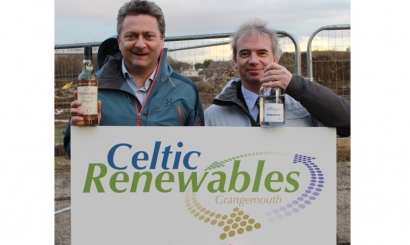
The company has established a new PLC – Celtic Renewables Grangemouth PLC – specifically to deliver this plant in Grangemouth and has launched a funding campaign seeking to raise £5.25million ($7.25 million) through an ISA eligible investment with Abundance Investment.
“We champion renewable projects across the UK and Celtic Renewables absolutely fits this remit,” said Abundance Cofounder and Managing Director Bruce Davis.
Based in Grangemouth, the two-acre site will produce Biobutanol, a new advanced and sustainable biofuel, which is a direct replacement for traditional fuel. It is produced from draff - the sugar-rich kernels of barley which are soaked in water to facilitate the fermentation process necessary for whisky production - and pot ale, the copper-containing yeasty liquid that is left over following distillation.
Used in a car for the first time in July 2017, Celtic Renewables has developed this ground-breaking process for biobutanol which the company expects to revolutionize sustainable transport.
Speaking about the new site, Mark Simmers, CEO of Celtic Renewables Ltd, said, “This is a huge step forward for Celtic Renewables as this demonstration plant will enable the roll out of the technology at full industrial scale across Scotland and internationally.”
With news that the plant expects to create 25 jobs in the local area, Councillor Cecil Meiklejohn, Leader of Falkirk Council said,“The new Celtic Renewables Grangemouth commercial demonstrator plant is great news for the local economy.”
Working closely with Tullibardine Distillery in Perthshire, Celtic Renewables is helping to derive value from the production residues of the Malt Whisky industry in Scotland which currently produces almost 750,000 tonnes of draff and 2 billion litres of pot ale, by converting it into much-needed advanced biofuel and other high value low carbon products.
With planning permissions now in place, building of the commercial demonstrator plant is due to begin in early 2018.

